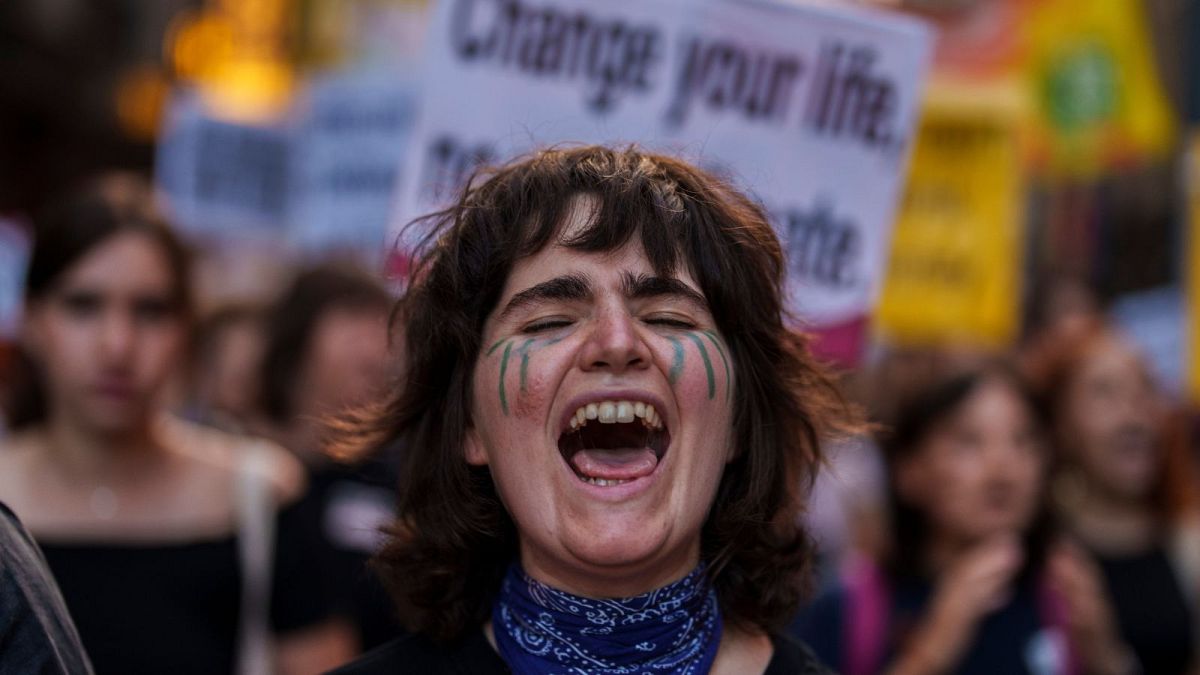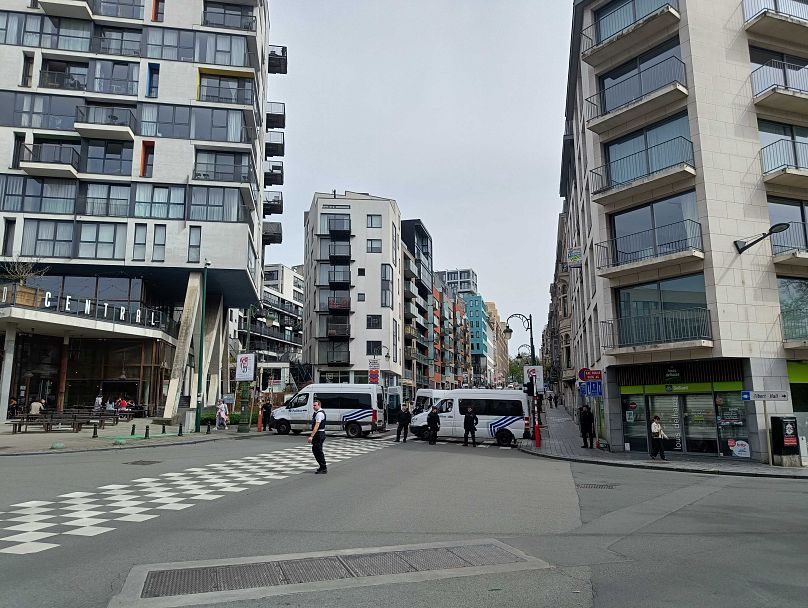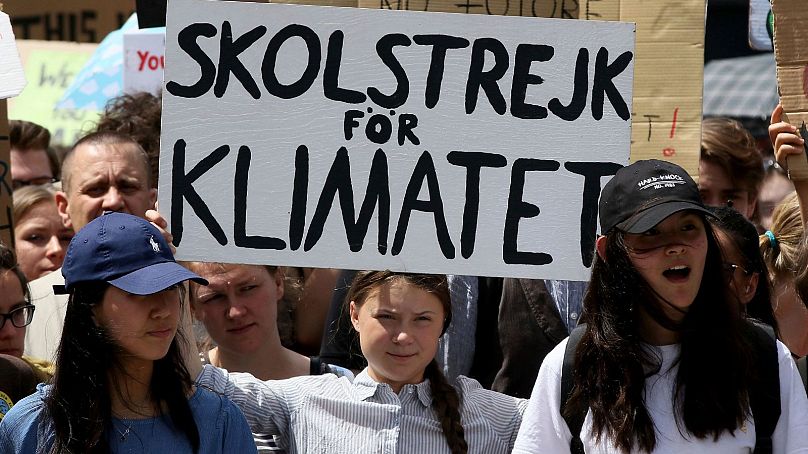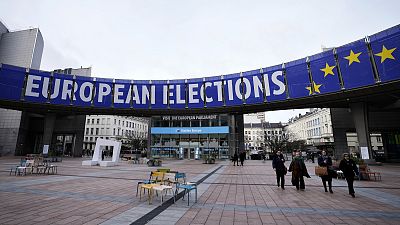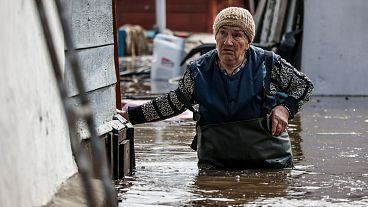The 2019 European elections were marked by the so-called Green Wave that saw climate action put firmly on the political agenda, but with fresh elections looming what do climate activists think about the last 5 years?
"The elections are coming" an activist cheerily reminds an older woman passing by as she hands her a leaflet.
It's a balmy spring day in Brussels and the city's Extinction Rebellion branch is staging a protest at Place Jean Rey, a stone's throw away from the European Parliament.
In less than two months over 400 million people will have the opportunity to go to the polls and decide who will fill that parliament.
The 100 or so demonstrators block a road under the watchful eye of multiple police officers.
“Our demand is to stop fossil [fuel] subsidies immediately, as the least that Europe can do to recognise its role historically and presently in fuelling the climate crisis,” says Dr Angela Huston Gold, a spokesperson for United for Climate Justice, a platform of environmental movements.
Climate activists are once again mobilising to make their voices heard.
What happened in the European Green Wave in 2019?
Five years ago the environmental movement was on a high.
Coordinated school strikes spearheaded by a teenage Greta Thunberg shoved climate action onto the political agenda.
The Greens had their best ever showing in a European election, topping the polls in several European cities and expanding their ranks to 71 MEPs.
“We were huge numbers and we were loud and we were together,” Laila Kriechbaum, a Fridays for Future activist, tells Euronews Green. She took part in the 2019 strikes in Austria as a 16 year-old school child and is now a national organiser for the group.
“Seeing how the green wave rolled all through Europe and had such a big impact, it was an extremely strong feeling seeing what the youth could do.
“And that created this momentum and power that kept rolling for months and climate strike after climate strike and years.”
What is the European Green Deal?
Harnessing this energy the EU introduced its European Green Deal, an ambitious legislative strategy aimed at making the bloc climate-neutral by 2050 through measures such as cutting greenhouse gas emissions, investing in renewable energy, and promoting sustainable growth.
“In the beginning we were still hopeful in the first part of the mandate,” says Julie Zalcman, a campaigner at Friends of the Earth Europe.
And there have been successes.
Zalcman points to the REPower EU strategy which aims to decrease the EU’s dependency on Russian fossil fuels by ramping up renewable energy to 45 per cent of the bloc’s energy mix by 2030. As well as the exit from the Energy Charter Treaty and the phase-out of combustion engines.
EU wants to reduce rampant deforestation
Greenpeace Europe also believes there have been some solid policies. It highlights the deforestation law as an example.
“It's something that we've been asking for for a very long time,” says John Hyland, the group’s press officer.
The EU has established a list of products highly associated with deforestation: cocoa, coffee, rubber, palm oil, soy, beef and wood.
From December 2024, importers and exporters trading with the EU must prove that these goods, or their derived products, do not come from recently deforested areas or cause forest degradation.
But perhaps opposition to this law is a symbol for the changing political headwinds in the EU. Celebrated as a green success when it passed, several ministers from EU countries are now calling for its implementation to be delayed.
Why is Europe facing a green backlash?
The mood music has changed since 2019. The Green Party is slipping in the polls and the far right is creeping up.
Climate legislation that looked to be in the bag is suddenly under threat as politicians are spooked by farmers’ protests and upcoming elections.
Among climate campaigners and activists there’s a sense that progress has been made and there have been some hard fought wins, but it’s not nearly enough.
The science and the EU’s own estimates back this up.
The 2023 EU Climate Action report states: “The EU and its Member States need to significantly step up their implementation efforts and accelerate emissions reduction to stay on track to reach the -55 per cent net greenhouse gas reduction target by 2030, and climate neutrality by 2050.”
Meanwhile records continue to roll.
March was the 10th month in a row to break the global temperature record, drought is gripping Catalonia, Sicily and other parts of Europe, and as we enter the wildfire season they are sure to burn with increasing intensity under ever hotter summers across the continent.
Climate activists are mobilising ahead of the European elections
So at such a pivotal moment for Europe's and the world’s future, what are activists doing in the build up to June’s elections?
Extinction Rebellion is clear: mobilise and disrupt in an attempt to put pressure on politicians.
The demonstration in Brussels earlier this month was part of the launch of a new campaign involving groups across 12 European countries. The Stop EU Fossil Subsidies movement says it will scale up its protests and blockades in the build up to the European elections.
“We see that blocking roads is stupid, right? This is clear,” says Dr Huston Gold, its spokesperson. “But, what's even clearer is that the government is continuing to subsidise these criminal industries destroying our future.”
Fridays for Future is also planning mass protests with a global climate strike called for 19 April and more on the way.
Kriechbaum wants to use a message of hope to get people on board and motivated.
“Look at what we have to lose and what is at stake and what could happen,” she says.
“And we are able to prevent this if we use our vote, especially as young people who are underrepresented.”
For campaign groups like Greenpeace Europe and Friends of the Earth Europe the fight continues in Brussels, by lobbying and influencing the changemakers.
“It can be extremely depressing caring about climate action and not finding a way to see the action,” says Silvia Pastorelli, a climate and energy campaigner at Greenpeace Europe.
“So the best thing is always get involved and put direct pressure on the people who make the decisions.”
